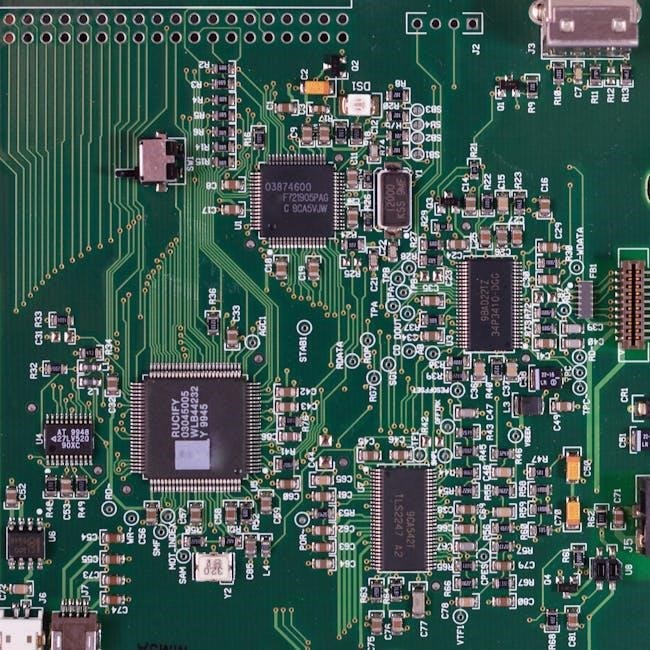Importance of CompTIA Network Certification
The CompTIA Network certification is a foundational credential for IT professionals‚ validating skills in networking concepts‚ infrastructure‚ and security. It enhances career opportunities‚ boosts technical expertise‚ and is globally recognized as a trusted standard in the industry.

1.1 Why CompTIA Network Certification is Crucial
The CompTIA Network certification is crucial for IT professionals as it validates foundational knowledge of networking concepts‚ infrastructure‚ and security. It serves as a stepping stone for career advancement‚ demonstrating expertise in configuring‚ managing‚ and troubleshooting networks. The certification covers essential domains such as networking fundamentals‚ hardware‚ operations‚ and security protocols‚ ensuring a comprehensive understanding of modern networking technologies. For individuals entering the IT field or seeking to enhance their skills‚ this certification is a globally recognized standard‚ trusted by employers worldwide. It also provides access to a wealth of study resources‚ including official guides‚ eBooks‚ and practice exams‚ making it easier to prepare and succeed. By obtaining this certification‚ professionals can gain a competitive edge in the job market‚ opening doors to roles like network administrators and technicians. It is particularly valuable for those with around one year of experience‚ solidifying their technical capabilities and career prospects.

1.2 Target Audience for the Certification
The CompTIA Network certification is designed for IT professionals seeking to validate their foundational networking skills. It is ideal for individuals entering the networking field or looking to enhance their knowledge of network administration. The certification is particularly suited for those with approximately one year of experience in IT‚ focusing on network-related tasks. It caters to network administrators‚ help desk technicians‚ and junior network engineers aiming to strengthen their expertise. Additionally‚ the certification is beneficial for students pursuing careers in IT infrastructure or those interested in advancing their understanding of networking concepts. The study materials‚ including official guides‚ eBooks‚ and practice exams‚ are tailored to support diverse learning styles‚ ensuring that all candidates can effectively prepare for the exam and achieve their career goals in the networking domain.
1.3 Exam Details and Structure
The CompTIA Network certification exam‚ designated as N10-008 (or N10-007 in earlier versions)‚ is a 90-minute assessment consisting of approximately 90 questions. The exam evaluates a candidate’s understanding of networking fundamentals‚ infrastructure‚ operations‚ security‚ and troubleshooting. To pass‚ candidates must achieve a score of around 720 on a scale of 100 to 900. The exam is available in multiple languages‚ including English‚ Japanese‚ German‚ and Spanish‚ making it accessible to a global audience. The questions are primarily multiple-choice‚ with some performance-based tasks that simulate real-world networking scenarios. Candidates are advised to prepare thoroughly using official study guides‚ practice exams‚ and virtual labs to ensure readiness for the exam’s comprehensive scope. The exam structure is designed to validate practical skills and theoretical knowledge‚ ensuring that successful candidates are well-prepared for entry-level networking roles.
Exam Objectives and Domains
The CompTIA Network exam covers five key domains: networking concepts‚ infrastructure‚ operations‚ security‚ and troubleshooting. It assesses foundational skills in network administration and problem-solving.
2.1 Networking Concepts and Fundamentals
Understanding networking concepts and fundamentals is essential for building a strong foundation in IT. The CompTIA Network certification emphasizes key topics such as IP subnetting‚ DHCP‚ DNS‚ and wireless networking. It also covers the OSI and TCP/IP models‚ which are critical for understanding how data flows through networks. Additionally‚ the exam focuses on network topologies‚ cable types‚ and routing and switching basics. These concepts are vital for configuring‚ managing‚ and troubleshooting network systems. By mastering these fundamentals‚ professionals can effectively design and maintain secure and efficient networks. The certification ensures a solid grasp of networking principles‚ enabling individuals to support various network infrastructures and technologies. This knowledge is indispensable for anyone aiming to excel in network administration or related IT roles.
2.2 Network Infrastructure and Hardware
Network infrastructure and hardware form the backbone of any networking environment. The CompTIA Network certification delves into the components that make up a network‚ including routers‚ switches‚ firewalls‚ and cables. It also covers wireless networking standards like Wi-Fi and Bluetooth‚ as well as network interface cards (NICs) and other peripherals. Understanding the physical installation of network devices‚ such as Cat5e‚ Cat6‚ and fiber-optic cables‚ is crucial for ensuring reliable connectivity. The certification emphasizes the importance of network topologies‚ such as star‚ mesh‚ and bus configurations‚ and how they impact performance. Additionally‚ it explores the role of hardware in network security‚ including intrusion detection and prevention systems. By mastering these topics‚ professionals can design‚ implement‚ and manage robust network infrastructures. The study guides and resources‚ such as the CompTIA Network Deluxe Study Guide‚ provide in-depth coverage of these areas‚ ensuring comprehensive preparation for the exam.
2.3 Network Operations and Management
Network operations and management are critical for maintaining efficient and reliable network performance. The CompTIA Network certification covers essential tools and techniques for monitoring‚ configuring‚ and managing network devices. This includes understanding network monitoring protocols like SNMP (Simple Network Management Protocol) and Syslog for logging and alerting. Additionally‚ the certification emphasizes the importance of network performance optimization‚ such as identifying bottlenecks and ensuring proper resource allocation. Key topics also include remote network management using protocols like HTTP/HTTPS for web-based management and SSH/Telnet for secure access. The study materials‚ such as the CompTIA Network Deluxe Study Guide‚ provide detailed insights into these areas‚ helping professionals master skills like network configuration backups‚ firmware updates‚ and documentation. By understanding these operational aspects‚ IT professionals can effectively manage and troubleshoot networks‚ ensuring smooth day-to-day operations and minimizing downtime.
2.4 Network Security Measures and Protocols
Network security is a cornerstone of the CompTIA Network certification‚ focusing on protecting data and ensuring safe communication. Key topics include understanding common threats like malware‚ phishing‚ and DDoS attacks‚ as well as implementing firewalls‚ intrusion detection systems‚ and VPNs. The certification emphasizes encryption protocols such as AES and RSA for data protection and secure authentication methods like multi-factor authentication (MFA). Students learn about secure network design‚ including segmentation‚ access control lists (ACLs)‚ and physical security measures. The study materials‚ such as the CompTIA Network Deluxe Study Guide‚ provide detailed coverage of security best practices and compliance standards. Additionally‚ the curriculum covers protocols like SSL/TLS for secure web traffic and IPsec for VPNs. By mastering these security measures‚ professionals can safeguard networks from vulnerabilities and ensure confidentiality‚ integrity‚ and availability of data. This knowledge is critical for real-world scenarios‚ making it a vital part of the certification.

2.5 Troubleshooting and Diagnostic Tools
Troubleshooting and diagnostic tools are essential for identifying and resolving network issues efficiently. The CompTIA Network certification emphasizes mastering tools like ping‚ traceroute‚ and ipconfig for diagnosing connectivity problems. Students learn to use network analyzers such as Wireshark to capture and analyze traffic‚ identifying bottlenecks and anomalies. The curriculum also covers hardware tools like cable testers and protocol analyzers for physical and logical network troubleshooting. Understanding syslog and SNMP for monitoring and managing network devices is another key area. The study materials‚ such as the CompTIA Network Deluxe Study Guide‚ provide hands-on exercises to practice troubleshooting scenarios. Additionally‚ virtual labs offer real-world simulations to refine diagnostic skills. By mastering these tools and techniques‚ professionals can quickly pinpoint and resolve network faults‚ ensuring minimal downtime and optimal performance. This expertise is critical for maintaining reliable and efficient network operations in any organization.
Study Materials and Resources
Official CompTIA Network study guides‚ deluxe editions‚ and eBooks provide comprehensive coverage of exam topics. Virtual labs‚ practice exams‚ and additional resources offer hands-on experience and real-world application of networking concepts and tools.
3.1 Official CompTIA Network Study Guides
The official CompTIA Network study guides are essential resources for exam preparation‚ offering in-depth coverage of networking fundamentals‚ infrastructure‚ security‚ and troubleshooting. The CompTIA Network Guide to Networks 9th Edition by Jill West‚ Tamara Dean‚ and Jean Andrews provides a comprehensive overview of networking technologies and real-world applications. Additionally‚ the Deluxe Study Guide includes practice exams and virtual labs‚ enhancing practical understanding. These guides are structured to align with the exam objectives‚ ensuring candidates master key concepts such as IP subnetting‚ DHCP‚ and wireless networks. They also include updated material on emerging technologies‚ making them indispensable for both newcomers and experienced professionals. By leveraging these official resources‚ aspirants can build a strong foundation and confidently approach the certification exam.
3.2 Deluxe Study Guide and Additional Resources
The Deluxe Study Guide for CompTIA Network certification offers an enhanced learning experience‚ combining comprehensive exam coverage with practical tools. Authored by networking expert Todd Lammle‚ this guide includes six practice exams‚ bonus content‚ and access to the Network Virtual Lab‚ allowing hands-on experience with real-world scenarios. Additional resources such as the Premium Edition eBook and Practice Test product provide a 40-value bonus‚ offering interactive learning opportunities. These materials are designed to complement the official study guides‚ ensuring a well-rounded preparation strategy. The Deluxe Study Guide is particularly beneficial for candidates seeking to deepen their understanding of networking concepts‚ infrastructure‚ and security. With its structured approach and extensive coverage of exam objectives‚ this resource is a valuable addition to any study plan‚ helping aspirants gain the confidence and skills needed to succeed.
3.3 eBooks‚ Virtual Labs‚ and Practice Exams

eBooks‚ virtual labs‚ and practice exams are essential resources for CompTIA Network certification preparation. The Deluxe Study Guide includes access to virtual labs‚ enabling hands-on practice with networking scenarios‚ while eBooks provide comprehensive coverage of exam topics. Practice exams simulate real test environments‚ helping candidates assess their readiness and identify areas for improvement. These resources cater to diverse learning styles‚ offering flexible and interactive ways to master networking concepts. Virtual labs allow practical application of skills‚ such as configuring routers and troubleshooting networks‚ while eBooks ensure accessibility and convenience for studying on the go. Practice exams also include detailed explanations of correct and incorrect answers‚ reinforcing learning. Together‚ these tools complement traditional study guides‚ ensuring a well-rounded and effective preparation strategy for the CompTIA Network exam.

Exam Preparation Strategies
Effective study strategies and structured plans are crucial for success. Utilize practice exams to assess readiness and focus on understanding networking concepts and troubleshooting techniques.
4.1 Effective Study Strategies and Plans
A well-structured study plan is essential for success in the CompTIA Network certification exam. Start by setting clear goals and dedicating consistent time for learning. Utilize official study guides‚ such as the CompTIA Network Study Guide: Exam N10-008‚ to cover all exam domains. Practice exams are invaluable for identifying weak areas and improving problem-solving skills. Focus on understanding key concepts like networking fundamentals‚ infrastructure‚ and security protocols. Allocate time for hands-on practice using virtual labs to reinforce theoretical knowledge. Regularly review and organize notes to ensure retention. Additionally‚ join online communities or forums for tips and real-world insights. Stay motivated by tracking progress and celebrating milestones. A disciplined approach combined with practical application will significantly enhance readiness for the exam.
4.2 Utilizing Practice Exams and Simulations
Practice exams and simulations are critical tools for preparing for the CompTIA Network certification. They provide hands-on experience and help identify areas needing improvement. The Deluxe Study Guide includes six practice exams and access to the Network Virtual Lab‚ allowing candidates to simulate real-world networking scenarios. These resources enable learners to test their understanding of concepts like routing‚ switching‚ and network security. Regularly taking timed practice exams helps improve time management and reduces exam-day anxiety. Simulations also allow candidates to troubleshoot issues in a risk-free environment‚ enhancing problem-solving skills. By consistently using these tools‚ individuals can refine their knowledge and gain confidence in their ability to apply concepts in practical situations. This comprehensive preparation ensures a strong foundation for success on the CompTIA Network exam.
4.3 Tips for Success on Exam Day

To ensure success on the CompTIA Network exam day‚ arrive early and stay calm. Bring required identification and any necessary materials. Skim through the entire exam first to gauge the difficulty and manage time effectively. Allocate more time to challenging questions and use the process of elimination for unclear answers. Avoid changing previously answered questions unless certain of a mistake. Use scratch paper for subnetting calculations and note important concepts. Stay focused and maintain a steady pace to complete all questions. Practice with timed simulations beforehand to build confidence and reduce anxiety. Reviewing key topics like network security and troubleshooting before the exam can also enhance performance. By following these strategies‚ candidates can approach the exam with clarity and maximize their chances of achieving a passing score.

Career Benefits and Advancement
The CompTIA Network certification boosts career prospects‚ offering opportunities in network administration‚ security‚ and infrastructure. It enhances technical skills‚ making professionals more competitive in the IT job market with specialized expertise.
5.1 Career Opportunities Post-Certification
Obtaining the CompTIA Network certification opens doors to various career opportunities in IT‚ particularly in network administration and management. Professionals can pursue roles such as Network Administrator‚ Network Technician‚ or Junior Network Engineer. The certification is ideal for individuals seeking entry-level positions or looking to advance in their current roles. It equips them with the skills to configure‚ manage‚ and troubleshoot networks‚ making them valuable assets to organizations. Additionally‚ the certification is recognized across industries‚ including healthcare‚ education‚ and government sectors‚ where reliable network infrastructure is critical. By mastering networking fundamentals‚ individuals can transition into specialized fields like cybersecurity or network architecture. The CompTIA Network certification also serves as a stepping stone for advanced certifications‚ such as CompTIA Security+ or Cisco CCNA‚ further enhancing career prospects. Overall‚ it provides a solid foundation for a successful and versatile career in IT networking.
5.2 Job Roles and Specializations
CompTIA Network certification prepares individuals for a variety of job roles and specializations in IT. Common positions include Network Administrator‚ responsible for managing and maintaining network infrastructure‚ and Network Technician‚ focused on troubleshooting and support. Professionals may also pursue roles as Junior Network Engineer‚ designing and implementing network solutions. Additionally‚ the certification serves as a foundation for specialized roles such as Network Security Specialist‚ where the focus is on protecting network systems from threats. It also opens opportunities in Wireless Networking and Network Architecture. The skills gained are versatile‚ allowing individuals to work in diverse industries‚ from healthcare to education. This certification is a stepping stone for advanced roles‚ such as Cybersecurity Analyst or Senior Network Engineer‚ making it a valuable asset for career growth in IT networking.

5.3 Salary Potential and Growth
CompTIA Network certification significantly enhances salary potential and career growth opportunities. Professionals with this credential can expect competitive salaries‚ with average earnings ranging from $50‚000 to over $90‚000 annually‚ depending on experience and location. Entry-level roles‚ such as Network Technicians‚ often start around $50‚000‚ while more experienced positions like Network Engineers or Senior Network Administrators can exceed $90‚000. Factors such as geographic location‚ industry‚ and additional certifications further influence salary ranges. For example‚ professionals in urban areas or specialized fields like cybersecurity may earn higher wages. Additionally‚ the demand for skilled networking professionals continues to grow‚ ensuring long-term career stability and advancement opportunities. This certification not only boosts initial earning potential but also positions individuals for higher-paying roles as they gain experience and expand their skill sets.
Additional Learning Resources
Enhance your preparation with official CompTIA Network study guides‚ eBooks‚ virtual labs‚ and practice exams. Join online communities and forums for peer support and access to exclusive resources and expert advice.
6.1 Online Communities and Forums
Online communities and forums are invaluable resources for CompTIA Network certification preparation. Platforms like Reddit’s r/CompTIA and specialized IT forums offer peer support‚ expert advice‚ and real-world insights. Many candidates share their study experiences‚ tips‚ and strategies‚ providing a collaborative learning environment. These communities often include links to free study guides‚ practice exams‚ and video tutorials. For example‚ Professor Messer’s forum is a popular destination for discussing networking concepts and troubleshooting techniques. Additionally‚ these spaces allow you to connect with professionals who have already passed the exam‚ gaining firsthand knowledge of challenging topics and exam strategies. By engaging with these communities‚ you can access a wealth of supplementary materials‚ including PDF study guides and practice questions‚ to enhance your preparation. They also serve as a motivational hub‚ helping you stay focused and informed throughout your certification journey.
6.2 Video Training and Tutorials
Video training and tutorials are essential resources for preparing for the CompTIA Network certification. Platforms like YouTube‚ Udemy‚ and Coursera offer a wide range of courses and tutorials that cover networking fundamentals‚ infrastructure‚ and security. These videos provide visual and interactive learning experiences‚ making complex concepts easier to understand. For example‚ Professor Messer’s video series on CompTIA Network is highly recommended‚ offering in-depth explanations of exam objectives. Additionally‚ Todd Lammle’s video tutorials are popular for their clear and concise coverage of networking topics. Many of these resources are free or low-cost‚ making them accessible to all candidates. Video training also allows learners to pause‚ rewind‚ and revisit difficult topics‚ enhancing retention and understanding. These tutorials often include hands-on demonstrations‚ such as configuring routers or troubleshooting network issues‚ which are invaluable for practical learning. By leveraging video training‚ candidates can supplement their study materials and gain a deeper grasp of networking principles.
6.3 Developer Tools and Platforms
Developer tools and platforms play a crucial role in preparing for the CompTIA Network certification by providing hands-on experience with networking technologies. Virtual labs‚ such as those included in the Deluxe Study Guide‚ allow candidates to practice configuring and troubleshooting networks in a simulated environment. Tools like Cisco’s Packet Tracer and GNS3 enable learners to design and test network topologies‚ reinforcing concepts like routing‚ switching‚ and security. Additionally‚ platforms like GitHub offer access to scripts and automation tools that can streamline network management tasks. These resources are particularly useful for IT professionals looking to enhance their practical skills. By leveraging these tools‚ candidates can gain real-world experience‚ which is essential for excelling in the certification exam and their future careers. These platforms also foster collaboration and innovation‚ making them invaluable for continuous learning and professional growth in the networking field.

